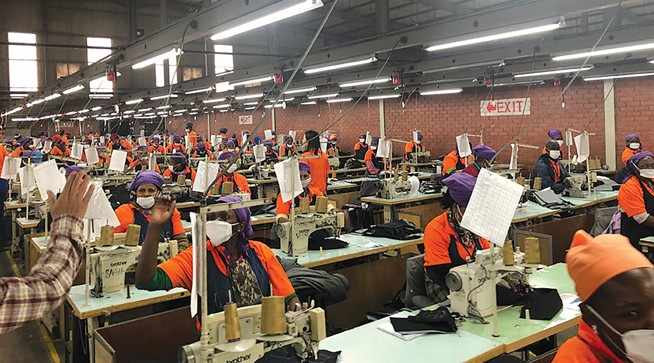… How desperate job seekers from Lesotho fall into trafficking rings
In Lesotho, where unemployment rates continue to rise, desperation is driving many people, especially women, into the arms of traffickers who promise jobs and a better life in South Africa. What they often find instead are conditions of exploitation, abuse, and survival in the shadows.
Women are the primary targets. They are lured with promises of factory jobs in places like Newcastle and Durban in South Africa. The recruiters prey on those lining up daily in Lesotho’s industrial areas, waiting for any opportunity. Some of the women already have jobs but are enticed by promises of better pay, housing, and working conditions.
But these are lies, designed to trap.
The story of ‘Matumelo
In 2022, after losing her factory job in Maseru due to the COVID-19 pandemic, ‘Matumelo (not her real name) became one of thousands of Basotho desperate to find work. Rather than sit at home, she began queueing outside factories in hopes of being rehired. That is where she met a smooth-talking Mosotho man who claimed to have connections with factories in Newcastle, South Africa.
At first, she did not believe him. But as the weeks dragged on and her situation worsened, she began to listen. The man made grand promises, good pay, accommodation, and transport, all taken care of. “I thought about my children,” she said. “They needed to eat, go to school. I felt I had no choice.”
Eventually, she decided to go, with her husband reluctantly agreeing.
On a Friday, with only a few belongings, she boarded a 22-seater van with others heading to South Africa. At the Maputsoe border, they crossed illegally, escorted by a woman claiming to be a police officer and several “Lirurubele,” known for helping people cross unlawfully. Each person paid M50 for the crossing.
“We spent the night on the road,” she recalled. “We arrived in Durban around 3am and were told to hand over our IDs.”
A nightmare begins
They were taken to a building resembling a factory but denied entry, allegedly because a Chinese employer had been killed there by Basotho workers. They were redirected to another factory where the nightmare began.
The building reeked. The room they were taken to was dark, cramped, and filthy, with a toilet beside the kitchen. Rats scurried freely. Exhausted, they slept sitting upright, surrounded by luggage and fear.
In the morning, a woman already working there laughed when she saw them. “You will see,” she told them. “You are about to go through what we did.” That was their first warning.
The so-called managers arrived later. One of them was a Mosotho woman. They offered no food or water. Only certain people were chosen for work. ‘Matumelo and one other woman were left behind. “They told me they did not know what to do with me because the machine I said I could operate wasn’t available,” she said.
“The workers worked tirelessly, sometimes until 1:00 AM before they were allowed to rest,” ‘Matumelo recalled.
When night fell, she and another woman asked where they were supposed to sleep. The answer was blunt. They were told that they would have to sleep on chairs. Only those who arrived with friends or family could sleep side by side.
With no beds or blankets, they lay across tables and on the cold, hard floor, covering themselves with whatever clothing they had brought from home.
Days passed without being offered food or even water. Eventually, they pooled what little money they had and managed to buy two loaves of bread to share among themselves.
By Sunday, the man who had recruited them in Lesotho finally arrived. Frustrated and furious, ‘Matumelo confronted him. “It seems like you were sent to destroy our lives,” she told him.
He assured them things would improve, but nothing changed.
As their desperation grew, some factory workers who had been there longer began sharing scraps of their own food. Still, it was not enough. Some could not even take life-saving medication due to the hunger.
The physical toll was quickly becoming unbearable. In her second week at the factory, ‘Matumelo’s health deteriorated drastically. She lost the ability to speak and could not feel the left side of her body.
She believed the decline was triggered not just by hunger, but also by the degrading environment. People had sex openly, anywhere, at any time. Women, especially new arrivals, were under pressure to survive however they could. Many turned to sex work.
“Even on Saturdays, when we finished work early, they would leave to drink and sell sex in the streets,” she said. “They told me to stay behind and wait for them.”
As her condition worsened, she was finally taken to a clinic. At the first, she was turned away because she was a Mosotho. At the next clinic, she received care. There, she met a South African who spoke Sesotho.
She was put on a drip and treated until she started recovering. But when she returned to the factory and asked to go home, her request was refused. Her identification document had been confiscated, and the managers insisted she could not leave until she repaid her transport costs from Lesotho.
Stuck once again in inhumane conditions, her health took another sharp decline. Fortunately, she managed to contact her brother in Johannesburg, who sent her R1,000 for transport.
Then came more distressing news that her child had been admitted to the hospital back in Lesotho. Overwhelmed by the stress, she collapsed and was rushed to the hospital once more.
Upon her release, the factory finally let her go. With her ID in hand, she made her way back home.
She crossed the Maputsoe border bridge and found a police officer. She explained everything. After spending the night in Maputsoe, she was helped with transport to Mafeteng, where her child was still hospitalised.
A path to healing
Ashamed, traumatised, and emotionally broken, ‘Matumelo could barely face anyone. But in Mafeteng, a police officer connected her with Beautiful Dreams Society, a local NGO that supports survivors of trafficking.
They arranged for her to see doctors, who helped restore her physical health. Counseling sessions followed. Slowly, she began to recover emotionally.
Beautiful Dreams Society later linked her with World Vision Lesotho through the Protection and Promotion of Human Rights (PPHR) project, funded by the European Union. She was given a sewing machine and fabric to start her own clothing business, a skill she already had.
Today, she’s rebuilding her life.
A national crisis
‘Matumelo’s story is not unique. According to Lerato Nkhetše, Executive Director of the Migrant Worker Association of Lesotho, many Basotho are caught in similar situations, especially in factories and farms across South Africa.
“They work hard but don’t see the benefits,” Nkhetše said. He spoke during a media training on Trafficking in Persons organised by the Ministry of Local Government and supported by Skillshare Lesotho.
Lesotho’s Anti-Trafficking in Persons Act (2011) defines trafficking as the recruitment, transport, harbouring, or receipt of persons for exploitation, including forced labour, prostitution, and organ removal.
Warning signs of trafficking
According to World Vision, trafficking is often driven by the intent to cause suffering and gain from a victim’s vulnerability. Methods of exploitation include prostitution, slavery, and organ harvesting.
Common signs that someone may be a victim of trafficking include being forced to work against their will, being unable to leave their workplace, and showing signs of restricted freedom of movement. Victims may also appear fearful or anxious, feel constantly watched, or endure abuse and threats directed at themselves or their families.
They are often subjected to dangerous or exploitative working conditions, live under the constant threat of violence, and may be pressured to accept obligations under false pretenses.
Many victims also lack trust in legal institutions, are threatened with arrest or deportation, and are afraid to reveal their immigration status. Frequently, their identity documents, such as passports or national IDs, are confiscated and held by their traffickers.
Lesotho’s standing and government efforts
Lesotho remains a Tier 2 country in the 2024 Trafficking in Persons Report by the United States Department of State. This classification means the country does not fully meet the minimum standards for eliminating trafficking, but it is making notable efforts toward compliance.
The report highlights some progress. The government increased funding to the Lesotho Mounted Police Service (LMPS) Anti-Trafficking and Migrant Control (ATMC) Unit, from M100,000 ($5,430) in 2022 to M135,000 ($7,330) in 2023.
The ATMC also maintained five specialised focal points, each with three to four investigators, in Botha-Bothe, Leribe, Mafeteng, Mohale’s Hoek, and Maseru.
However, protection efforts have declined. In the most recent reporting period, the government identified and referred nine trafficking victims to care services, six victims of sex trafficking, two of labour trafficking, and one victim of unspecified trafficking.
This represents a significant drop from the 25 victims identified and referred in the previous year.
Summary
- On a Friday, with only a few belongings, she boarded a 22-seater van with others heading to South Africa.
- At the Maputsoe border, they crossed illegally, escorted by a woman claiming to be a police officer and several “Lirurubele,” known for helping people cross unlawfully.
- “They told me they did not know what to do with me because the machine I said I could operate wasn’t available,” she said.

Ntsoaki Motaung is an award-winning health journalist from Lesotho, specializing in community health stories with a focus on sexual and reproductive health and rights, as well as HIV. She has contributed to platforms like “Be in the KNOW,” highlighting issues such as the exclusion of people with disabilities from HIV prevention efforts in Lesotho.
In addition to her journalism, Ntsoaki serves as the Country Coordinator for the Regional Media Action Plan Support Network (REMAPSEN). She is also a 2023 CPHIA Journalism Fellow.








